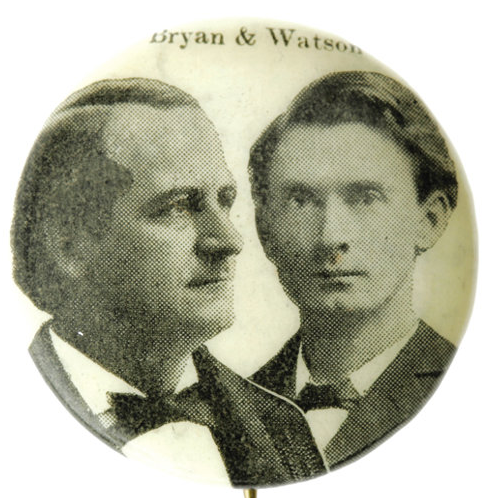Monday, June 3, 2019
Thomas Edward Watson
Thomas Edward Watson, September 5, 1856 (Thomson, Ga.)– September 26, 1922 (Washington, DC)
VP candidate for People's Party (1896)
Running mate with nominee: William Jennings Bryan (1860-1935)
Popular vote: 222,583 (1.6%)
Electoral vote: 27/447
The campaign:
With the nomination of William Jennings Bryan the Democratic Party had managed to co-opt many issues long advocated by third parties. The Democratic ticket was endorsed by the single-issue Silver Party, but the People's Party found themselves in a bind. Would they split the vote and help elect McKinley, or would they endorse Bryan?
What they came up with was something of a compromise that in the end worked for no one. They endorsed Bryan but wished not to tolerate his corporate industrialist running mate Arthur Sewall. The Vice-Presidential nomination was given to fiery former Congressman Thomas E. Watson of Georgia. So Bryan had two running mates from two different political parties.
Bryan and Watson were reluctant comrades. The standard bearer basically ignored his Populist VP during the campaign even though Watson was active in his electioneering efforts. Watson included his rival Sewall among the targets in his political attacks.
In a result where the word "fiasco" and "debacle" are frequently used by historians, Bryan lost, Watson began his political journey into racism and religious bigotry, and the People's Party began their collapse.
Although the Bryan/Watson ticket did not garner a high percentage of popular votes, they did earn a respectable tally of 27 in the Electoral College: Arkansas 3, Louisiana 4, Missouri 4, Montana 1, Nebraska 4, North Carolina 5, South Dakota 2, Utah 1, Washington 2, Wyoming 1.
Election history:
1882- Georgia General Assembly (Democratic)
1891-1893 - US House of Representatives (Ga.) (Alliance Democrat/People's Party)
1892 - US House of Representatives (Ga.) (People's Party) - defeated
1894 - US House of Representatives (Ga.) (People's Party) - defeated
1895 - US House of Representatives (Ga.) (People's Party) - defeated
1898 - US House of Representatives (Ga.) (Populist Party) - defeated
1900 - US House of Representatives (Ga.) (Populist Party) - defeated
1904 - US President (Populist Party) - defeated
1908 - US President (Populist Party) - defeated
1911 - Democratic primary US Senate (Ga.) - defeated
1918 - US House of Representatives (Ga.) (Democratic) - defeated
1922-1922 - US Senate (Ga.) (Democratic)
Other occupations: school teacher, attorney, presidential elector (Ga.) for Cleveland 1888, newspaper editor, magazine publisher, author, novelist.
Buried: Thomson City Cemetery (Thomson, Ga.)
Notes:
While in Congress was one of the forces behind the creation of Rural Free Delivery (the postal RFD)
Was considered a progressive inclusionist in the 19th century but during the 20th century had shifted
to a white supremacist, anti-Catholic, antisemitic and Nativist political stand.
He opposed America's entry into World War I and the draft which made him sympathetic to the
Socialists (who he had earlier shunned). The Federal postal system (including RFD no doubt) ceased delivering his publications.
His father was a CSA Army wounded veteran.
Watson sent his child to Catholic school while attacking the Church at the same time.









